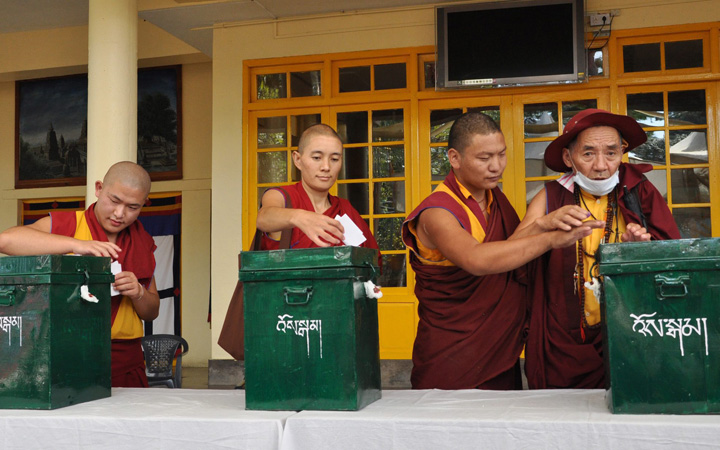DHARMSALA, India – As Tibetans around the world voted Sunday in the first round of elections to choose a new government-in-exile, candidates were debating how to carry on their campaign to free their Himalayan homeland from Chinese rule.

Hundreds of Tibetans, including monks and nuns wearing wine-colored robes, lined up behind voting kiosks in the north Indian hill town of Dharmsala, where the exiled government is based. One by one, they wrote the names of their favourite candidates on pieces of paper and slid them into green ballot boxes.
It’s just the second time Tibetans are voting since the Dalai Lama stepped down as head of the government-in-exile in 2011 to focus on his role as Tibetan Buddhist spiritual leader.
“He wants us to stand on our own feet and decide about the future of Tibet,” said Tsering Tsomo, who heads the Tibetan Centre for Human Rights and Democracy in Dharmsala.
Tsering Tsomo noted that Tibetan democracy was still developing. “We have the institution, but not the culture,” she said.
The Tibetan community – comprising some 130,000 people spread across communities from Minnesota and Norway to Nepal and Taiwan – thrust itself onto the international stage and consciousness after the Dalai Lama fled Chinese occupation in 1959 and settled in exile in India. Rallying behind a charismatic leader and the single cause of freeing Tibet, the community proved a major irritant to Beijing.

Get breaking National news
But exiled Tibetans have struggled in recent years to maintain a cohesive political voice, while seeing China’s diplomatic and economic clout grow.
In a telephone interview with The Associated Press, incumbent Prime Minister Lobsang Sangay was frank in acknowledging that little progress has been made. The last round of talks between envoys of China and the Dalai Lama was in 2010, 25 years after the Dalai Lama proposed Tibetans give up on independence and instead seek a “middle way” – regional autonomy under China through peaceful dialogue.
WATCH: China marking half-a-century of communist control over Tibet
“As far as talks with China are concerned, there is a status quo,” said Lobsang Sangay, who is running for re-election.
One candidate for prime minister has riled the debate by rejecting the Dalai Lama’s middle way policy and instead arguing that the community should be demanding full independence for Tibet.
“It’s fashionable to talk about the middle way, but it kills the passion to act,” said the candidate, Lukar Jam. A writer and political activist, Lukar Jam also suggested that China could not be trusted to honour Tibetan autonomy, saying Beijing “makes regular changes in its constitution where minority rights are concerned.”
Because it’s considered unwise and impolite to question the Dalai Lama’s wisdom, Lukar Jam has earned the nickname the anti-Dalai Lama. But he said his critics were missing the point.
“I have separated the spiritual and political Dalai Lama and criticize only his political policies,” he said.
Many Tibetans, however, still defer to the Dalai Lama, despite his having given up his political powers. They see the Dalai Lama, whom they believe is the reincarnation of the god of compassion, as their leader in everything and the best judge of what’s right for the community as a whole.
The parliamentary speaker, Penpa Tsering, has even refused to debate Lukar in public. “I cannot give importance to someone who openly maligns the Dalai Lama,” said Penpa Tsering, who is running for prime minister.
“We find nothing wrong in the middle way approach, but only in the Chinese response to it,” he said.
More than 80,000 Tibetans worldwide had registered to vote in Sunday’s elections, which will decide which parliamentary and prime ministerial candidates will run in the final polls on March 20. The results from Sunday’s voting are expected in December.

Comments